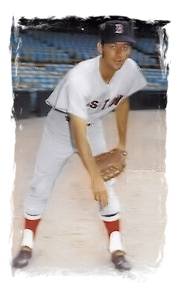 |
Charles Oscar Hartenstein was born on May 26, 1942 in Seguin, Texas. He established his credentials as a pretty tough pitcher early on in his career. He was the star pitcher of the 1960 AAA state baseball tournament, throwing a 3-1 win over Kilgore and firing a no-hitter against Snyder in the championship game. He was one out away from a perfect game in that final game, too. During the tournament, he struck out 21 batters in 14 innings and didn’t allow a run over his last 12 innings of work. Chuck attended the University of Texas, and played in the baseball team from 1962 through 1964 under head coach Bibb Falk. During his time there, the Longhorns won the SWC championship in 1962 and 1963 and finished in third place in the College World Series each year. Falk initially had him working as a reliever, but he ended up as a valuable starter. Chuck signed with the Chicago Cubs on June 1, 1964. Despite his success in college, there weren’t any other teams interested in him, as it was felt that he was too small (5’11”, 155 pounds) to make it in professional ball. The Cubs sent him to the St. Cloud Rox of the Northern League. He was even better in 1965, with a 12-7 record and 2.18 ERA for Dallas-Fort Worth. All of a sudden, the pitcher that almost every team in Major League Baseball thought was too small to succeed found himself in the major leagues. The Cubs promoted Chuck to the majors in September of 1965. The 23-year-old spent most of his time on the bench, except for one game on September 11th, when he was used… as a pinch-runner. It would be more than a year before Chuck would get a chance to actually pitch in a major-league game. He pitched fairly well for Tacoma of the Pacific Coast League, though his record was 3-10 as a swingman. The Cubs brought him back to Chicago in September, and he made his pitching debut on September 13th against Atlanta. In 5 games, he had a 1.93 ERA in 9-1/3 innings pitched. In his two remaining seasons with Chicago, Chuck was never able to stick on the big-league roster, for a full season. Though he got a late start, in 1967, he was the second most-used reliever for the Cubs behind Bill Hands. Chuck struggled in 1968, a large part of that was due to Joe Torre. He beaned the Braves slugger in April, sidelining him for a month with severe facial fractures. When Torre came back, he hammered Chuck with 3 hits in 3 at-bats, including a game-winning RBI double against the Cubs on June 16th. That was one of the last games Chuck pitched for the Cubs before the team sent him back to Tacoma for most of the rest of the season. The Pittsburgh Pirates acquired the reliever, along with infielder Ron Campbell, for outfielder Manny Jimenez in January of 1969. Originally optioned to Pittsburgh’s minor leagues, Chuck pitched himself onto the major-league roster with a strong spring. He picked up 10 saves for the Pirates to lead the team and had a 5-4 record and 3.95 ERA. He started the 1970 season as a short man in Pittsburgh, picking up a win, a loss and a save in short order. He started to pitch less frequently, went on the disabled list with a sore arm and never came off it. Pittsburgh quickly sold his contract to the St. Louis Cardinals. He was released in July with an ERA approaching 9. The Red Sox signed Chuck, and he had an ERA of 8.05 in 17 appearances. He finished 1970 with a 6.74 in 40 games with three teams, and it looked that it might have been the end of his career. For the next six seasons, he became a mainstay reliever in the Pacific Coast League, pitching two seasons each with Tucson (a White Sox affiliate), Phoenix (San Francisco) and Hawaii (San Diego). Along the way, he became something of a late-inning specialist, with double-digit save totals in 1971-73. In the end, it was major-league expansion that helped him return to the majors. The Toronto Blue Jays signed the 35-year-old pitcher in November of 1977, shortly after the team completed its expansion draft. He pitched in 13 games for the Blue Jays and spent more than a month on the DL and made his last pitching appearance on July 26th. After spending a month on the bench, Toronto announced that he would become the team’s minor-league pitching instructor, ending his playing career. After his retirement as a player, coaching kept Chuck pretty busy. Cleveland hired him to be their pitching coach for 1979, replacing Harvey Haddix. He became the team’s minor-league pitching instructor after a year before heading back to Honolulu to be the Islanders’ pitching coach. All along the way, he kept his offseason job as a real-estate agent back in Texas. He then spent a season in the White Sox organization before spending three years as the pitching coach for the Milwaukee Brewers, under manager Trebelhorn. He then served as an advance scout for the California Angels. Chuck volunteered as a pitching instructor for the Texas Longhorns 1993 College World Series team. He was inducted into the Texas Athletics Hall of Honor in 2004. Chuck Hartenstein died on October 2 at the age of 79. |
|||||
